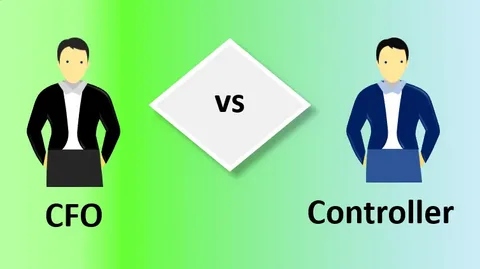Financial Controller vs CFO

Accounting
Imagine you work in a growing company with a full accounting team that records every transaction, prepares monthly reports, and monitors expenses.
But during a management meeting, the CEO asks:
Why did costs increase this quarter?
Can we afford to expand into a new market?
What’s our cash flow forecast for the next six months?
At that moment, you realize that numbers alone don’t answer strategic questions.
You need Financial Modeling, Analysis, and above all, Leadership.
Here comes the big question:
What’s the difference between a Financial Controller and a Chief Financial Officer (CFO)?
The Financial Controller: The Guardian of Accuracy
The Financial Controller is the backbone of financial reporting.
Their role is to ensure every number is correct, every account is reconciled, and every report is compliant.
Core Responsibilities:
- Prepare monthly and annual financial statements
- Oversee accounting operations and internal controls
- Ensure tax compliance and regulatory adherence
- Monitor expenses, budgets, and variances
- Support audits and financial reviews
The Controller ensures that the organization’s financial data is clean, consistent, and reliable.
The CFO: The Strategic Financial Leader
The CFO is not just managing finances — they are shaping the future.
They connect financial data with business strategy, ensuring sustainable growth and profitability.
Core Responsibilities:
- Develop long-term financial strategies
- Guide investment and funding decisions
- Lead cash flow and capital management
- Communicate with stakeholders and investors
- Drive business performance through insights
A great CFO doesn’t just report results — they create them.
Key Differences
|
Criteria |
Financial Controller |
CFO |
|
Focus |
Accuracy & Reporting |
Strategy & Leadership |
|
Time Horizon |
Short-term |
Long-term |
|
Decision Level |
Operational |
Executive |
|
Primary Goal |
Compliance & Control |
Growth & Vision |
In short:
Controllers keep you compliant.
CFOs keep you competitive.
Working Together
When both roles exist, they create a powerful synergy:
- The Controller ensures accuracy and stability.
- The CFO drives strategy and growth.
Together, they transform finance from a back-office function into a strategic powerhouse.
Understanding the difference between a Financial Controller and a CFO helps businesses build a balanced structure — one that combines precision with vision.
Frequently Asked Questions – Financial Controller vs CFO
- What is the main difference between a Financial Controller and a CFO?
A Financial Controller focuses on accuracy, reporting, and compliance, while a CFO focuses on strategy, growth, and decision-making. - Who prepares financial reports?
The Controller prepares monthly and annual financial reports; the CFO reviews them, interprets the data, and uses insights to make strategic decisions. - Can a company operate without a CFO?
Small businesses can start with a Controller, but as they scale, they need a CFO to lead financial strategy, funding, and investment planning. - Can a Financial Controller become a CFO?
Yes، Many CFOs start as Controllers and grow into leadership roles by developing strategic thinking, communication, and financial planning skills. - Who manages cash flow?
The CFO oversees cash flow management, forecasting, and funding, while the Controller ensures accuracy in daily cash transactions. - Who holds the higher position?
The CFO is higher in the hierarchy and part of the executive leadership team, while the Controller reports to the CFO. - Which role suits startups more?
Startups usually begin with a Controller to maintain accounting discipline, and later add a CFO to drive strategic growth. - Does the CFO participate in business decisions?
Yes, the CFO plays a crucial role in strategic planning, investment, and expansion decisions alongside the executive team. - Is the Controller’s role limited to accounting?
Not entirely، Controllers also manage internal controls, audits, and compliance frameworks to ensure operational integrity. - How do companies decide which role they need?
It depends on company size and maturity، for accounting accuracy, hire a Controller، for financial leadership, hire a CFO.
If your company is expanding and needs professional financial leadership or structural planning, contact 360Business Partners today.
📩 info.egy@360business-partners.com
📞 +20 15 69189796 | +966 59 935 4746
🔗 Visit our website
Related Articles
Explore Articles on Finance, Accounting, and Career Growth


